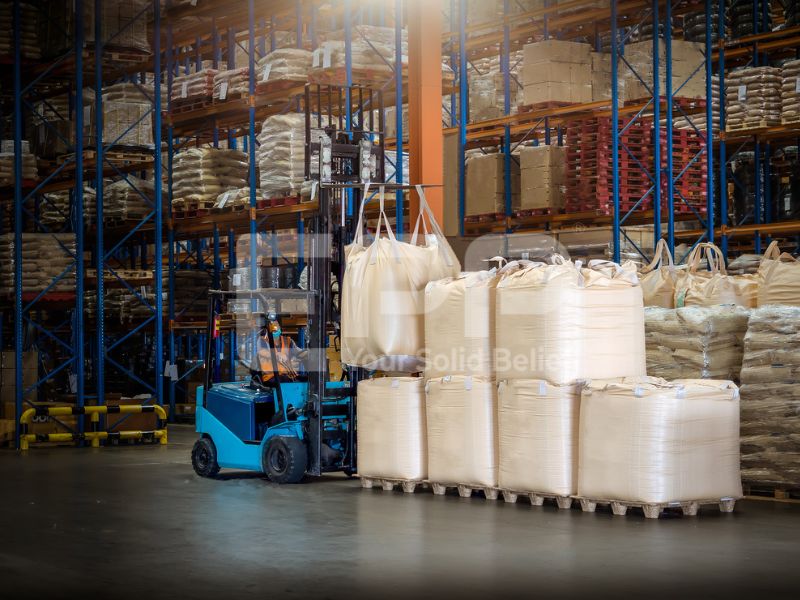FIBCs, or Flexible Intermediate Bulk Containers, are essential tools in various industries for transporting and storing bulk materials. Commonly referred to as FIBC bags, bulk bags, super sacks, or jumbo bags, these containers are made from durable materials such as woven polypropylene. As the use of FIBC bags continues to grow, so does the question of their recyclability. This article will explore what FIBCs are, their environmental impact, their recyclability, the benefits of recycling them, and how to properly dispose of them.
What Are FIBCs?

FIBCs are large, flexible containers designed to hold and transport bulk materials efficiently. Typically constructed from woven polypropylene, these bags can carry substantial weights, often exceeding 1,000 kilograms (2,200 pounds). FIBC bags are widely used in various sectors, including agriculture, construction, chemicals, and food processing. Their versatility allows them to accommodate a wide range of products, from grains and fertilizers to powders and granules.
The design of FIBC bags includes features such as lifting loops, which facilitate easy handling and transportation. Their stackable nature makes them space-efficient, allowing for optimal storage in warehouses and transport vehicles. The advantages of using super sacks over traditional packaging materials, such as cardboard or metal containers, include lower shipping costs, reduced waste, and increased efficiency in material handling.
The Environmental Impact of FIBCs
While FIBC bulk bags offer many benefits, they also pose environmental challenges, particularly concerning plastic waste. The primary material used in manufacturing FIBCs, polypropylene, is a type of plastic that can take hundreds of years to decompose in landfills. This raises concerns about the environmental impact of single-use jumbo bags, especially as industries strive to adopt more sustainable practices.
The production of FIBC bags involves energy-intensive processes that contribute to carbon emissions. Additionally, improper disposal of PP bulk bags can lead to pollution and harm wildlife. As awareness of environmental issues grows, the need for responsible practices regarding FIBCs becomes increasingly urgent.
Are FIBCs Recyclable?
Yes, FIBCs are recyclable, and many facilities have the capability to process these bags. The recycling process typically involves several steps:
- Collection: Used bulk bags must be collected and sorted. Many businesses have programs in place to return used bags to manufacturers or recycling facilities.
- Cleaning: Before recycling, jumbo bags must be cleaned to remove any contaminants, such as residual materials or dirt. Contamination can hinder the recycling process, making it crucial to ensure the bags are adequately prepared.
- Shredding: Once cleaned, the big bags are shredded into smaller pieces. This increases the surface area, making it easier to process the material.
- Reprocessing: The shredded polypropylene can then be melted down and reformed into pellets, which can be used to create new products, such as recycled FIBC bags or other plastic items.
Despite the recyclability of FIBCs, there are challenges that can complicate the process. Contamination is a significant issue, as residues from the materials previously stored in the bags can make recycling difficult. Moreover, not all recycling facilities accept super sacks, which can limit options for proper disposal.
Benefits of Recycling FIBCs
Recycling FIBCs offers numerous benefits, both environmentally and economically:
Environmental Conservation: Recycling reduces the amount of plastic waste that ends up in landfills, helping to mitigate pollution and conserve natural resources. It also decreases the energy consumption associated with producing new plastic materials.
Economic Advantages: For businesses, recycling can lead to cost savings by reducing waste disposal fees and potentially generating revenue from selling recyclable materials. Using recycled materials can also lower production costs for manufacturers.
Product Innovation: The recycling process allows for the creation of new products from old materials. This not only reduces waste but also encourages innovation in product development.
Sustainability: By adopting recycling practices, companies can enhance their sustainability initiatives, demonstrating a commitment to environmental responsibility. This can improve brand reputation and attract environmentally conscious consumers.
How to Properly Dispose of FIBCs

To ensure FIBCs are disposed of responsibly, consider the following steps:
- Check Local Regulations: Before disposing of big bags, check local recycling regulations to understand what is accepted in your area. Some regions have specific guidelines for recycling or disposing of plastic materials.
- Clean the Bags: As mentioned earlier, cleaning bulk bags before disposal is crucial. Ensure all residues are removed to prevent contamination during the recycling process.
- Return to Supplier: Many FIBC manufacturers and suppliers offer take-back programs for used bags. Contact your supplier to see if they accept returns or have recycling options available.
- Use Recycling Facilities: If your local area has recycling facilities that accept FIBC bags, take advantage of these services. Ensure the bags are sorted and cleaned according to the facility’s requirements.
- Explore Reuse Options: Before disposing of super sacks, consider whether they can be reused. Many businesses find ways to repurpose these bags for storage or other applications.
Where to Buy High-Quality FIBCs from Vietnam
If you’re looking for high-quality FIBCs, consider contacting EPP Vietnam Co., Ltd. They are a leading supplier of FIBC bags, offering a range of options, including bulk bags, super sacks, and jumbo bags. EPP Vietnam is committed to quality and sustainability, ensuring their products meet industry standards while also addressing environmental concerns.
Whether you need bulk bag for construction, agriculture, or any other application, EPP Vietnam provides reliable solutions tailored to your needs. Their experienced team can assist you in selecting the best FIBC for your specific requirements, ensuring optimal performance and durability. Trust EPP Vietnam for your FIBC needs and experience exceptional service.
In conclusion, FIBCs are recyclable, and understanding their lifecycle can help businesses adopt more sustainable practices. By recycling jumbo bags and following proper disposal methods, we can reduce environmental impact and promote responsible usage of plastic materials. As industries continue to seek eco-friendly solutions, the recycling of PP big bags will play a crucial role in achieving sustainability goals.

